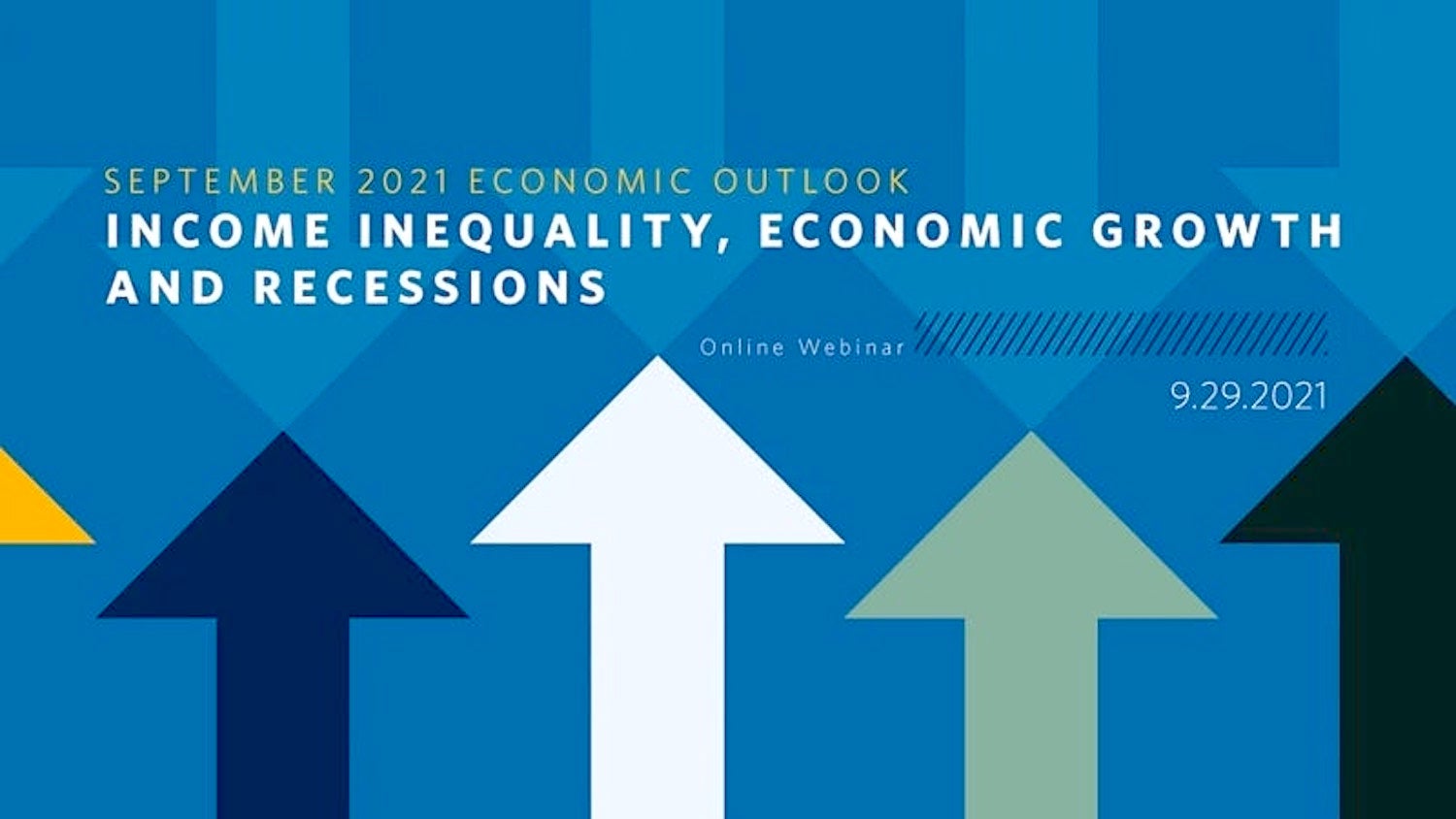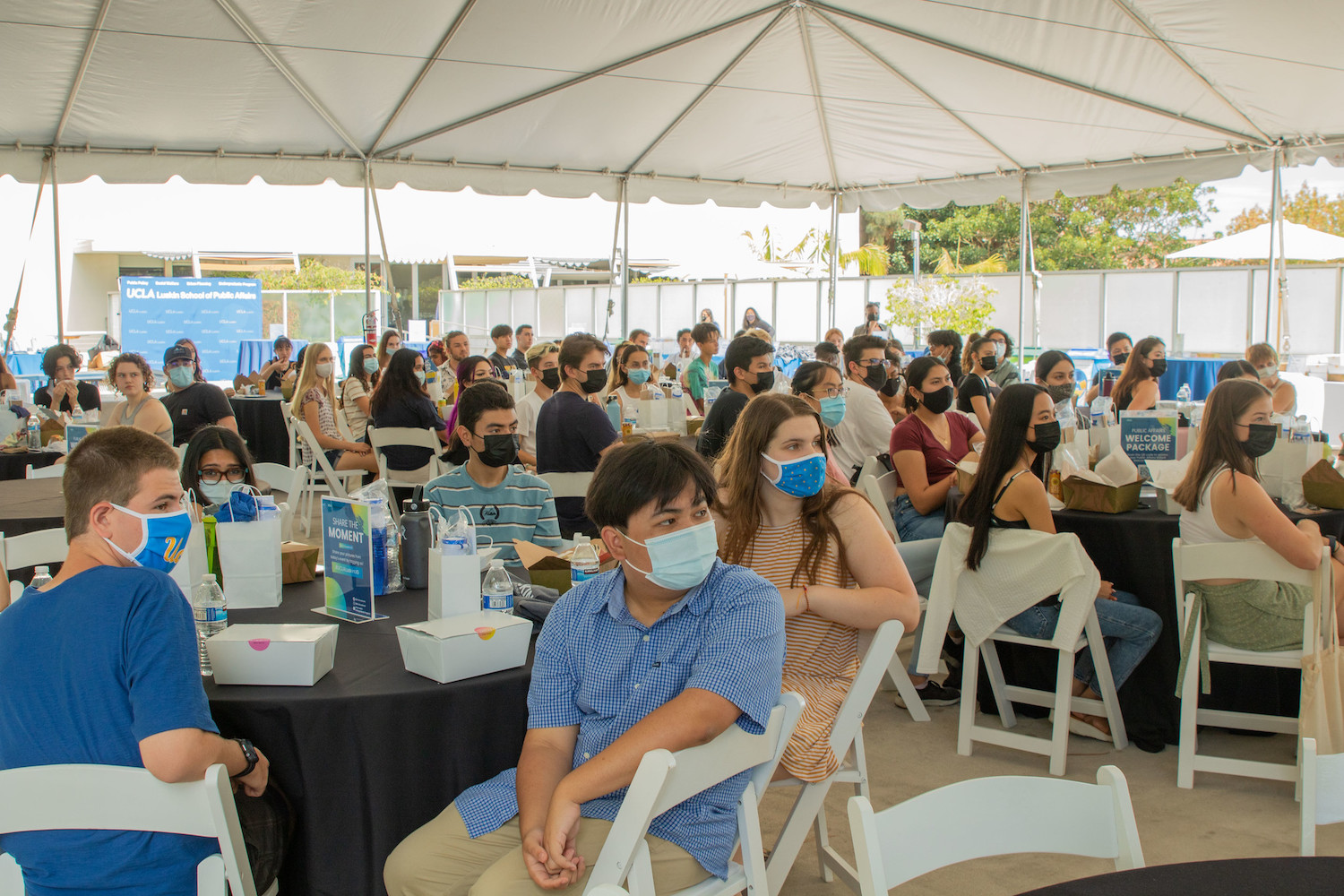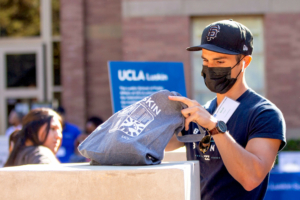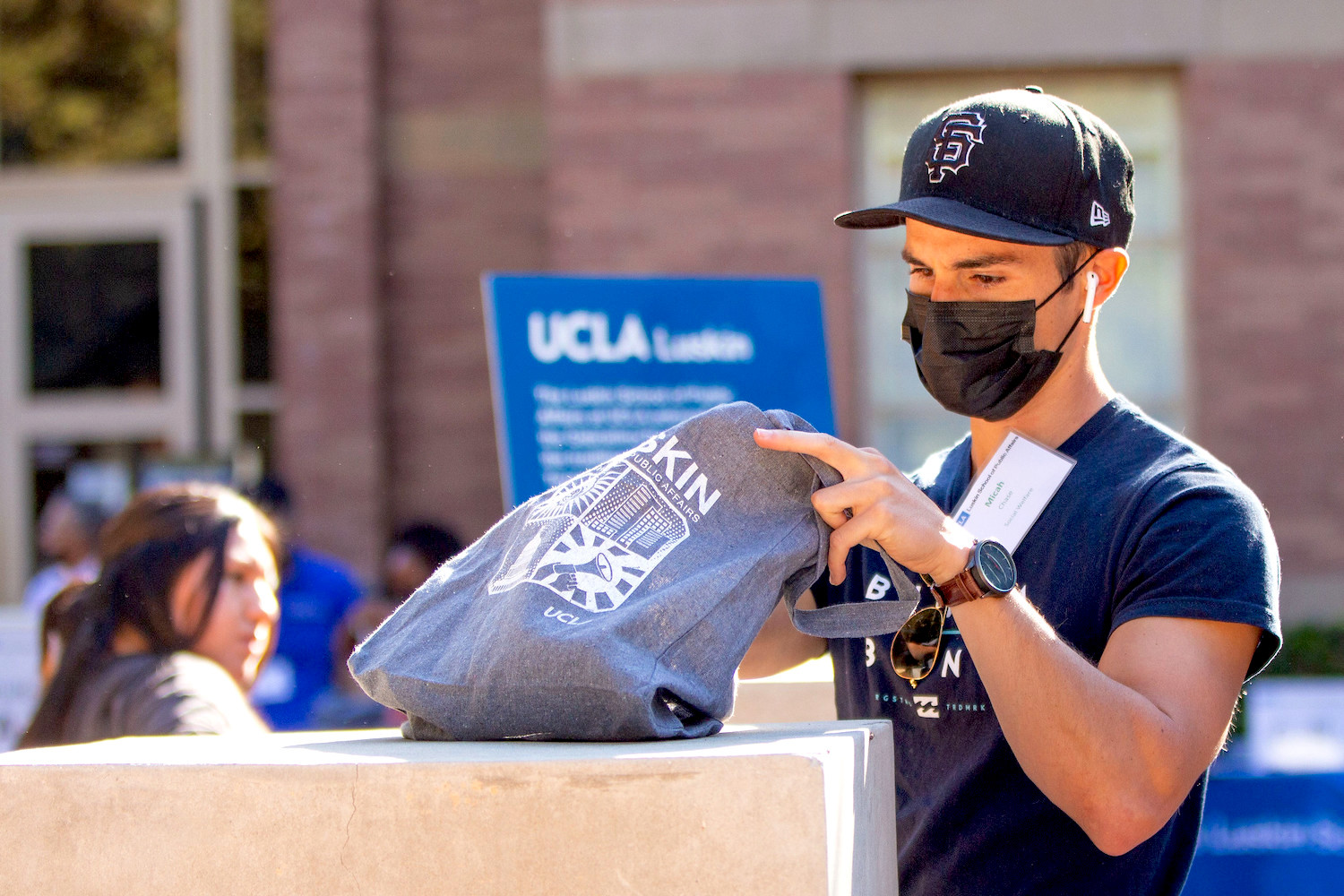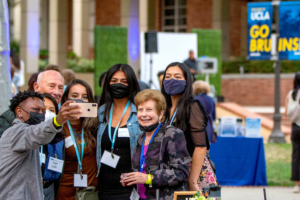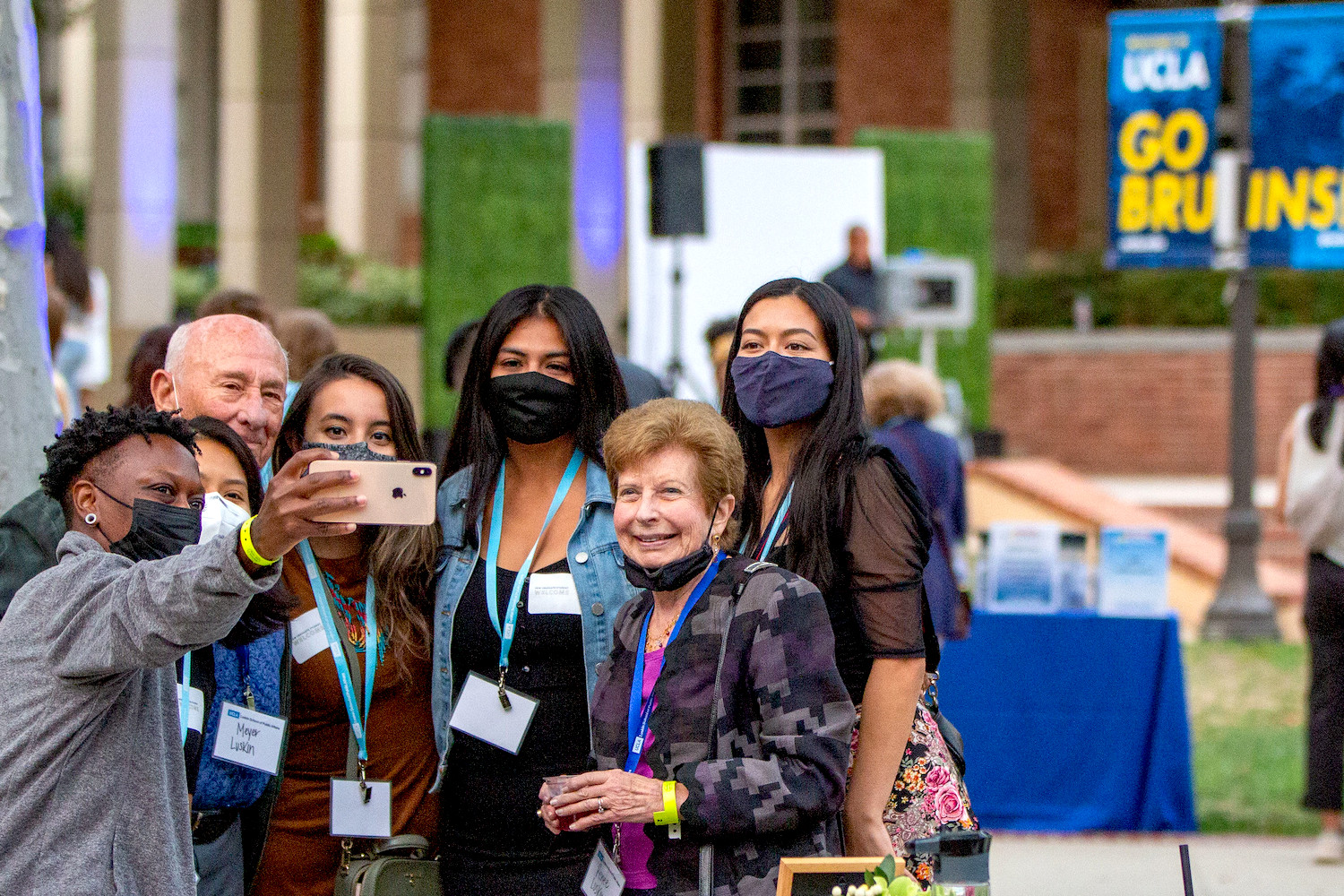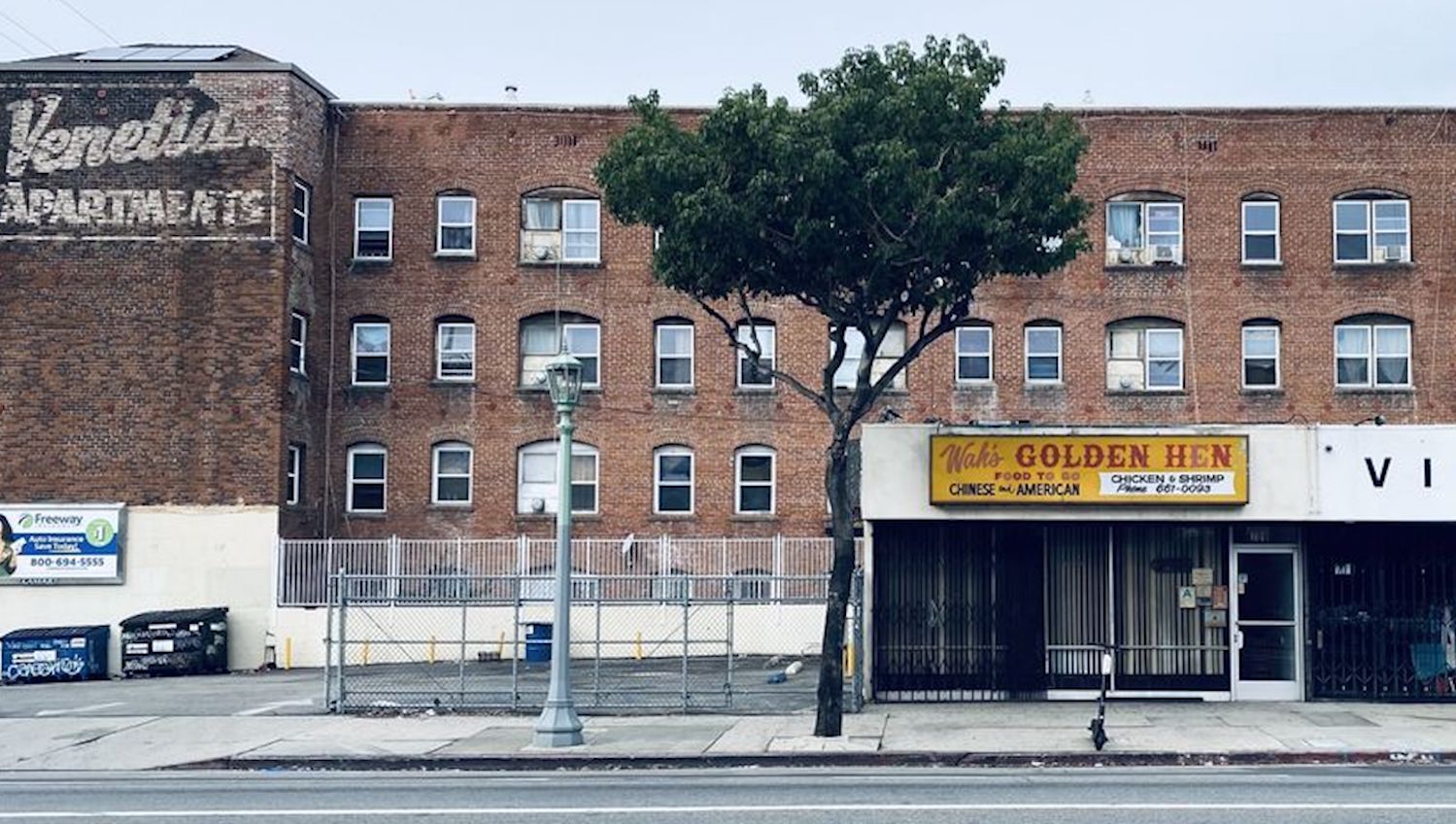A Community-Building Vision for the Chicano Studies Research Center
As the director of UCLA’s Chicano Studies Research Center, Veronica Terriquez draws on her background as a community organizer to enhance Latino community networks and presence on campus, and further support university-community partnerships. On Sept. 24, UCLA announced steps it was taking as it seeks to achieve Hispanic Serving Institution status, and Terriquez and the center’s staff and faculty will become partial stewards of that process. The center will administer the hiring of 15 new faculty positions and 20 postdoctoral fellows whose teaching, scholarship or mentoring experience has ties to Latino experiences. “Research shows that underrepresented students fare better when they have a faculty mentor who can relate to their experiences,” said Terriquez, a professor of urban planning at UCLA Luskin. Terriquez has also expanded the Chicano Studies Research Center’s faculty advisory committee, which now includes a greater breadth of disciplinary backgrounds. And on Nov. 1, the center is planning a special virtual Dia De Los Muertos event, open to the UCLA community. “The program will feature Dia de Los Muertos-related arts and performances, but it will also feature the hard data that remind us of the devastation Latinx communities have experienced during the current pandemic,” Terriquez said. “It will be a celebration and a call to action because we can’t let this happen again.” Looking ahead, Terriquez will be working on California Freedom Summer, a project that will train and place college students as summer 2022 interns at nonprofit organizations where they will focus on voter education ahead of the fall midterm elections. — Jessica Wolf
Lens Explores Low-Density Zoning Impact on Health
Associate Professor of Urban Planning and Public Policy Michael Lens published a policy brief in Health Affairs on the downstream effects of low-density residential zoning on health and health equity. Previous research on the relationship between housing and health has identified four important pathways for health equity: housing stability, housing quality and safety, neighborhood characteristics and affordability. While residential zoning ordinances are designed to address density-related concerns such as traffic and environmental harms, Lens explained that “the effect is often to artificially raise the cost of housing for everyone by limiting housing supply, as well as to exclude people who cannot afford to buy single-family homes on large lots.” As a result, low-density zoning practices have exacerbated segregation by income and race. “Safer and healthier neighborhoods tend to have the most restrictive zoning, pricing people out of those areas and increasing segregation and affordability problems,” Lens said. He acknowledged that zoning reform alone cannot fix disparities in housing or health; sufficient housing subsidy programs are crucial, as well as an increase in new housing developments that are required to set aside some units for lower-income households. “The downstream effects of exclusionary land use regulations on health should make scholars and policymakers pay more attention to reforming zoning and expanding housing subsidy programs to make housing more plentiful and affordable,” Lens wrote. Even if increasing density in more neighborhoods does not have an immediate effect on housing affordability, segregation or health, Lens argued that it is a necessary step toward a healthy and sustainable future.
Turner Calls for Equitable, Coordinated Approach to Extreme Heat
Extreme heat events — such as the road-buckling, record-smashing temperatures seen throughout the West this past summer — are becoming more deadly and common in a rapidly changing climate. Assistant Professor of Urban Planning V. Kelly Turner, who also serves as the co-director of the UCLA Luskin Center for Innovation, co-authored a new article in Nature dissecting the issue of extreme heat and outlining the necessary components of an equitable strategy to address the crisis. Unlike with fires and floods, no single government body is responsible for managing extreme heat, making it difficult to implement effective strategies that protect communities. “Protecting people from extreme heat will require a coordinated and well-researched government approach,” Turner said. “This is especially crucial for advancing equity and reducing the disproportionate effect heat has on people of color and low-income communities.” The authors of the paper laid out several key actions to address the issue of extreme heat. First, they recommended advancing heat equity by investigating how communities of color and low-income communities are disproportionately affected by extreme heat events. Next, they recommended expanding research on the effectiveness of different interventions as well as associated risks and tradeoffs of different strategies. They also suggested that governments work together to integrate and coordinate plans for measuring and combating extreme heat. Finally, they proposed building programs and institutions dedicated to heat management and expanding research in the field. Turner and her colleagues emphasized the importance of coordinated, strategic and equity-focused action in order to manage extreme heat.
Grant to Support LPPI Research on Strengthening Latino Workforce
The UCLA Latino Policy and Politics Initiative (LPPI) has received $750,000 from The James Irvine Foundation to support data collection and research on the impacts of COVID-19 on Latino workers in California. The grant will also support the development of a policy toolkit to improve the capacity of California lawmakers, business leaders and advocates to champion recovery efforts that strengthen the state’s core workforce. “Latinos are the current and future workforce of California and the road to prosperity runs through them. Yet we often lack the data necessary to make the best policy decisions and targeted investments to uplift Latinos,” LPPI Executive Director Sonja Diaz said. “Opportunity and economic mobility for California’s Latinos is necessary for us all to thrive now and far into the future.” Latinos are the largest ethnic/racial group in the country, and a plurality in California, so understanding their contributions to the nation’s social and economic fabric is imperative, Diaz said. She added that providing opportunities to make a living wage and build new skills in a changing economy is critical to a strong recovery in the wake of the COVID-19 pandemic. The Irvine Foundation grant will support data collection focusing on eight areas: demography and population change; climate change and the environment; economic opportunity and social mobility; education; health; housing; child welfare; and voting rights and political representation. “We know that Latinos are essential to California’s future,” said Virginia Mosqueda, senior program officer at the Irvine Foundation. “Supporting UCLA LPPI helps ensure our state leads the nation in offering Latino workers access to economic opportunity.”
Gilens, Ong on Forces Undermining a Just Economic Recovery
UCLA Luskin’s Martin Gilens and Paul Ong shared insights on economic and political inequality and opportunity as part of a panel organized by the UCLA Anderson Forecast, a quarterly report that frames the economic outlook for California and the nation. Released Sept. 29, the latest report identified a shift from earlier forecasts, which had raised hopes for a blockbuster recovery as COVID-19 vaccines became widely available. Heading into the final quarter of 2021, these hopes have been tempered by the spread of the Delta variant and stagnating vaccination rates, which in turn have led to consumer caution. A panel of experts hosted by the Anderson Forecast brought context to these findings, with a focus on how income is distributed unevenly across the United States. Gilens, chair of UCLA Luskin Public Policy, said political and economic inequality are intertwined, resulting in policies that cater to moneyed interests. “Taming the role of money in American politics won’t be easy, especially with an unsympathetic Supreme Court, and … won’t by itself fix everything that ails our democracy,” Gilens said. “But it’s hard to see how we can fix American democracy without reducing the dominance of money in our politics.” Ong, director of UCLA’s Center for Neighborhood Knowledge, focused on race and ethnicity as factors in the job, food, housing and educational insecurity that persists across generations. “I would encourage my colleagues to think much more explicitly about the fundamentals of why race and racism exist within an economy,” he said. “Simply saying that everybody should have equal opportunity doesn’t make it so.”
View the Anderson Forecast presentation, including a keynote address by Mary C. Daly, president of the Federal Reserve Bank of San Francisco.

A Warm Welcome to UCLA Luskin
The Luskin School welcomed students and alumni back to campus with a series of celebrations and orientations to launch the new academic year. The 10th annual UCLA Luskin Block Party on Sept. 23 drew a record crowd as students, alumni, faculty, staff and supporters such as Meyer and Renee Luskin gathered on Dickson Court North to connect with one another after an 18-month stretch of remote learning brought on by the COVID-19 pandemic. Health protocols remained in force during Welcome Week, which included graduate student informational and networking sessions and an open house for undergraduates focusing on the public affairs major. The week wrapped up with an exclusive reception for Class of 2020 graduates in the School’s public policy, social welfare and urban planning programs.
View UCLA Luskin photo galleries from:
Pandemic’s Toll on Southern California’s Asian American-Owned Businesses
Because of the COVID-19 pandemic, a significant portion of Asian American-owned businesses in Southern California had, by April 2021, experienced financial losses, closures and staff reductions, and many of them struggled to access local, state or federal aid, according to a new UCLA policy brief. The brief is based on data from a survey conducted during the first four months of 2021 by the Asian Business Association of Los Angeles, whose findings were published by the Asian Business Center, the UCLA Center for Neighborhood Knowledge, directed by Research Professor Paul Ong, and the UCLA Asian American Studies Center, directed by Urban Planning Professor Karen Umemoto. Researchers asked 400 Asian American business owners in Southern California about the impact of the pandemic. Businesses represented a variety of industries, including manufacturing, retail, transportation, professional services, restaurants, services and health care. Roughly 60% of respondents reported a large negative effect from the pandemic. “While some companies were able to minimize their losses by pivoting to online sales, owners who are older reported that they struggled to make that transition,” Ong said. “On the other hand, younger business owners said they faced eligibility barriers when they tried to access recovery funds that would help their companies survive.” The policy brief recommends that policymakers simplify the financial relief application process and work with community organizations to provide additional technical assistance for business owners. Three out of four of the businesses surveyed were immigrant-owned, and nearly half were owned by women. People of Chinese, Filipino, Japanese, Korean and Vietnamese descent made up the largest portion of the survey. — Jessica Wolf




